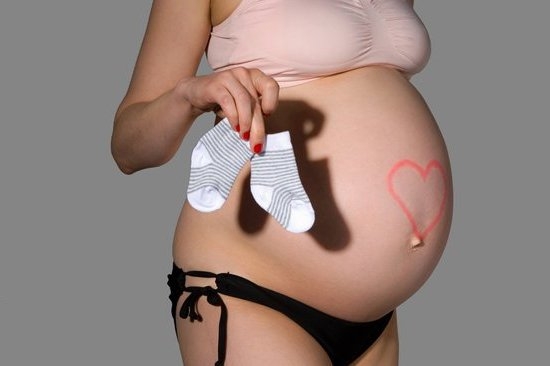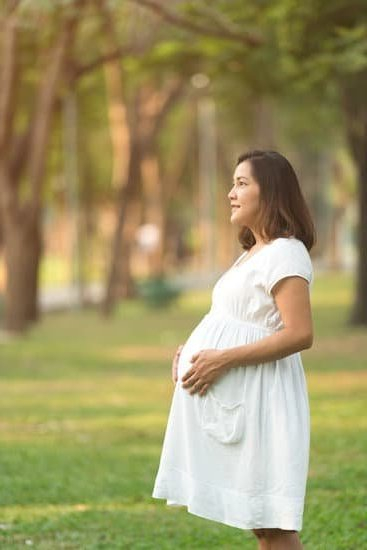Introduction
Bigger nipples during pregnancy can be an exciting and welcome change for many women. They may feel more attractive and feminine when their increased size adds to their overall look. Nipples are important body parts that play a role towards sexual arousal, making them visually desirable during this phase in life. But bigger nipples also have a more practical purpose–to help ensure the successful nourishment of a baby after it is born.
During pregnancy, female sex hormones cause your nipples and surrounding area to swell and become larger than usual. The tissue grows and darkens due to increased blood flow, which makes them easier for your baby to latch onto. The areola, or ring of skin around the nipple, will often grow wider as well. This allows mother and baby to better connect during feeding sessions, forming an important bond between them as they get to know one another after delivery. Milk ducts increase in size too, allowing milk production to begin sooner so that the demands of your growing baby can be met without difficulty.
Having bigger nipples during pregnancy is not only normal, but it can benefit you immensely once you become a mom. Hopefully this information has helped you understand why this occurs and the importance that it holds for both you and your new bundle of joy!
Anatomy & Physiology of the Nipple and Surrounding Tissue
The anatomy of the nipple and surrounding tissue include the areola, skin, and duct system. The areola is a circular area of modified sweat glands surrounding the nipple. These glands produce an oily substance that helps keep the nipple lubricated. As well, it gives the surface of the nipple a unique texture. The skin around the nipples is different than other parts of your body. It is thicker, hairier and contains many follicles (tiny pores inside which hairs grow).
The duct system is located beneath the skin and made up of tiny tubes that connect to each other to form a single main tube, which runs from the back of your breast down to the tip of your nipple. When these tubes become blocked or when too much fluid builds up in them, it can cause inflammation and swelling, which can make your nipples larger during pregnancy. In addition, hormones produced during pregnancy can also encourage blood flow to this area making the nipples become more sensitive, bigger and darker in color due to increased blood supply.
Hormonal Changes During Pregnancy
During pregnancy, many hormonal changes occur within a woman’s body that can cause her nipples to become bigger. The primary hormones responsible for the enlargement of the nipples during pregnancy are progesterone and estrogen.
These two hormones cause changes throughout the body in order to prepare it for childbirth. When these hormones increase during pregnancy, they also trigger an increase in breast and nipple size, primarily due to an increase in fatty tissue and overall breast development in order to facilitate breastfeeding once the baby is born.
Progesterone and estrogen not only affect the breasts and nipples but they also influence other aspects of the body such as skin sensitivity, lactation, blood volume levels, fluid retention, and increased muscle tone in preparation for contractions during labor.
Causes of Increased Nipple Size
Though nipples often become larger during pregnancy, there are several other reasons why this may occur.
One cause of increased nipple size can be hormonal fluctuations, such as those that occur during menopause or puberty. Changes in levels of the hormones estrogen and progesterone can lead to engorgement of the breasts and nipples. Specific medical conditions, such as prolactinomas (tumors on the pituitary gland) and conditions that cause higher than normal levels of estrogen or testosterone can also lead to nipple enlargement.
External factors can also cause the nipples to enlarge. Heavy use of moisturizers or lotions on the chest area can make them appear slightly larger due to a small amount of swelling from holding more moisture. Women who wear bras with wires or who sleep without proper support during pregnancy may also experience some soreness and swelling in the nipples due to friction from clothing and sheets.
In some cases, enlarged nipples may not be a sign of an underlying condition but rather simply an individual’s normal anatomy. Extended cold exposure can also cause temporary increase in nipple size due to vasoconstriction, where blood vessels constrict near the surface of the skin, causing it to swell temporarily.
Benefits of Bigger Nipples During Pregnancy
Positive Effects:
Bigger nipples during pregnancy can be beneficial for breastfeeding. Many women find that having bigger, darker and more prominent nipples makes it easier to locate the nipple area and latch on a baby better. Furthermore, this is especially helpful if a mother has inverted nipples which make latching on tougher. Additionally, women with bigger nipples often reports increased sensitivity in the area, making breastfeeding even more comfortable for both the mom and baby.
Negative Effects:
Although bigger nipples can have many benefits during pregnancy, there may also be a few drawbacks associated with them. For example, some mothers might feel self conscious about the larger size and appearance of their breasts and nipples postpartum. Additionally, larger nipples can sometimes become sore or uncomfortable when not wearing a supportive nursing bra due to increased weight they need to support while nursing. Finally, because larger nipples create further distance between a mother’s lips and her babies mouth while nursing can cause babies to swallow air which could lead to gassiness or indigestion problems.
How Can You Ensure Your Nipples Don’t Get Too Big?
During pregnancy, many moms-to-be experience a change in the size of their nipples. This is due to the hormonal changes that occur throughout pregnancy, as well as the extra blood flow to their breasts. The primary hormones associated with nipple growth during pregnancy are estrogen and progesterone.
To limit the size of your nipples, some lifestyle changes can be beneficial. One suggestion is to ensure you have adequate support from proper fitting bras. Wearing bras that are too tight or constricting can cause your nipples to stretch more than necessary and become bigger over time. Taking breaks from wearing bras for several hours each day can also help reduce nipple size since it allows them to move without extra pressure or restriction. Eating a healthy diet full of nutrient-rich foods and exercising regularly can also help keep hormone levels balanced, which may prevent excessive nipple growth. Lastly, try using cold compresses when nursing or pumping, as this may reduce the overall swelling and discomfort associated with larger nipples while breastfeeding.
The Importance of Nipple Care During Pregnancy
During pregnancy, it is normal for nipples to get bigger and darker. This happens as your breasts start preparing to nurse your baby after birth. Nipple enlargement can be uncomfortable and can even cause pain or itching in some women. As a result, it’s important for pregnant women to take proper care of their nipples to ensure that they are healthy during pregnancy and ready for nursing once the baby arrives.
It is recommended that pregnant women wash their nipples daily with warm water, mild soap, and a soft cloth. This will help keep them clean and free from any infections which may occur due to the increased exposure that occurs during pregnancy. Women should also avoid using any bath oils or lotions as these can further irritate the sensitive skin of the nipple area. The use of a cold compress, such as an ice pack or a chilled face cloth, may help relieve itching and irritation in this area as well. Additionally, wearing breathable fabrics like cotton bras may help keep the nipples dry which can reduce irritation caused by dampness. Lastly, some pregnant women choose to use lanolin ointment both morning and night time on their nipples to moisturize them throughout pregnancy.
Conclusion
Bigger nipples during pregnancy can make nursing and the early days of breastfeeding easier for mothers. Larger nipples tend to be easier for babies to latch on to, reducing nipple soreness and allowing the mother to comfortably feed her child. During labor, larger nipples can enhance uterine contractions, resulting in a shorter labor period. Some studies have also suggested that bigger nipples are associated with higher milk production in the mother, allowing better nourishment for the baby. Bigger nipples might even help with bonding between mother and baby, making it easier for both to form a deeper emotional connection. In addition to aiding in breastfeeding, bigger nipples can also provide great visual appeal to a pregnant woman’s body without posing any health risks; they are simply nature’s way of preparing mom and baby for nursing.

Welcome to my fertility blog. This is a space where I will be sharing my experiences as I navigate through the world of fertility treatments, as well as provide information and resources about fertility and pregnancy.





